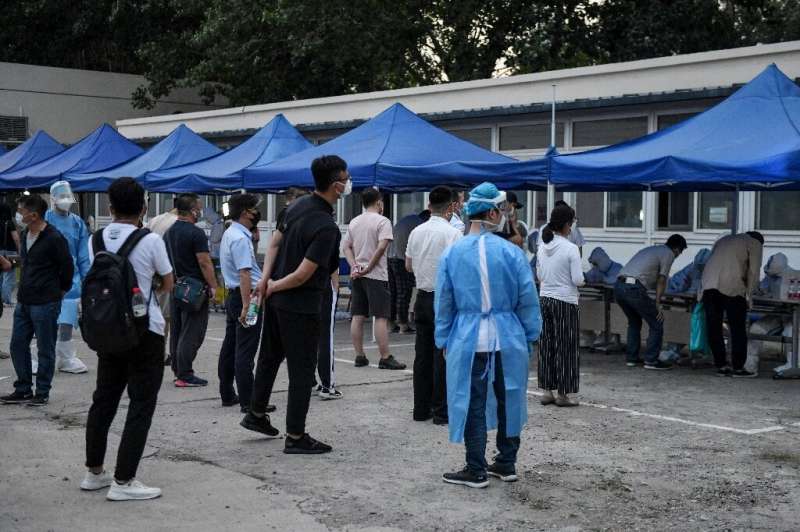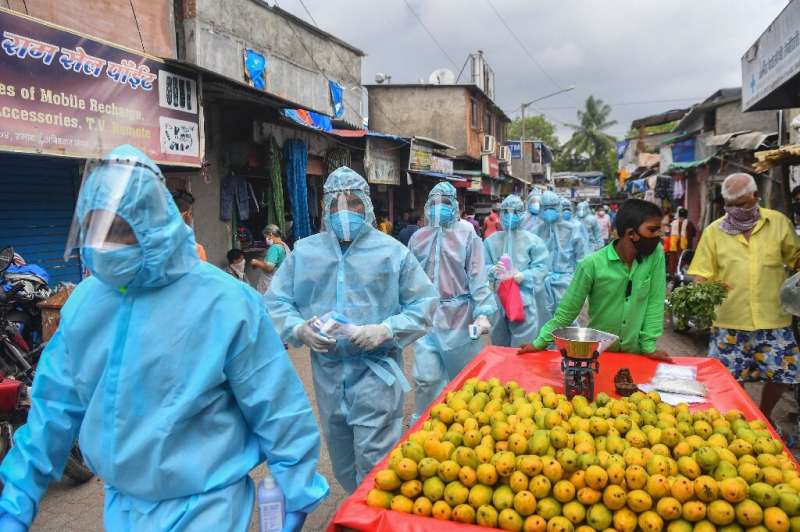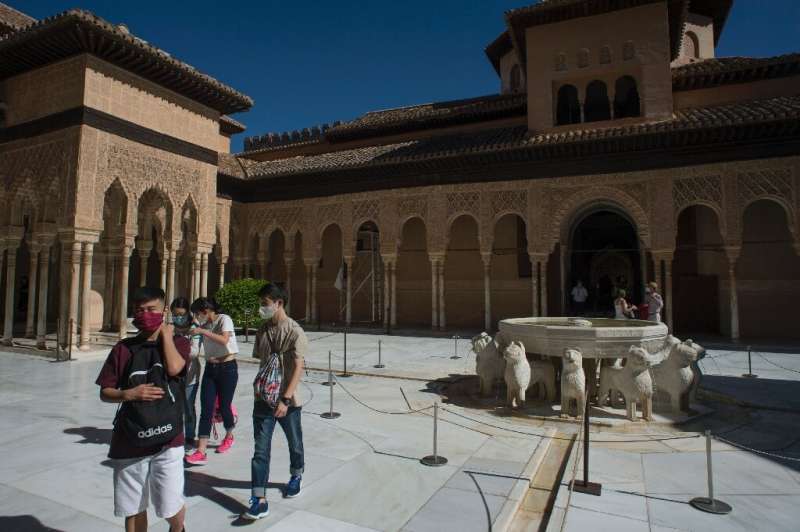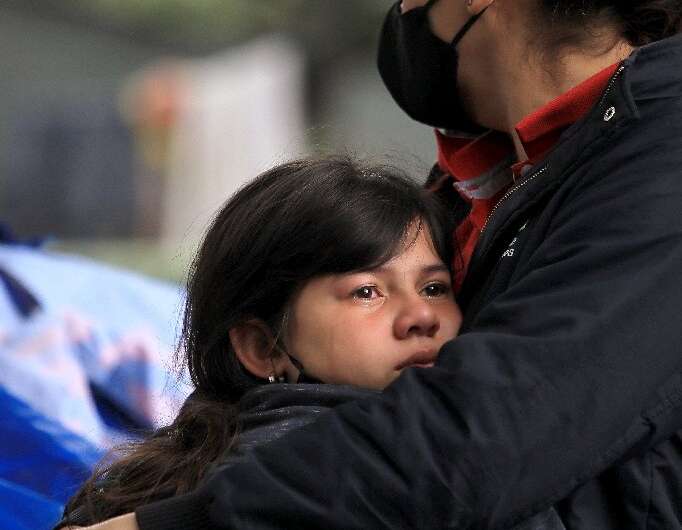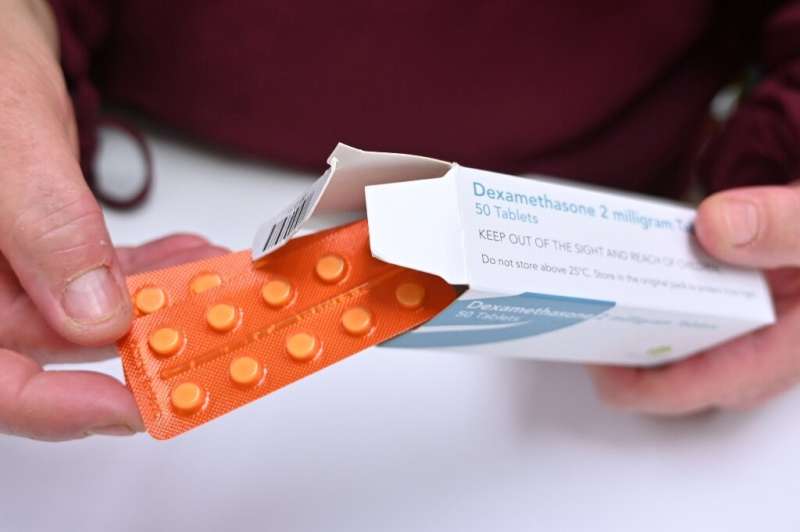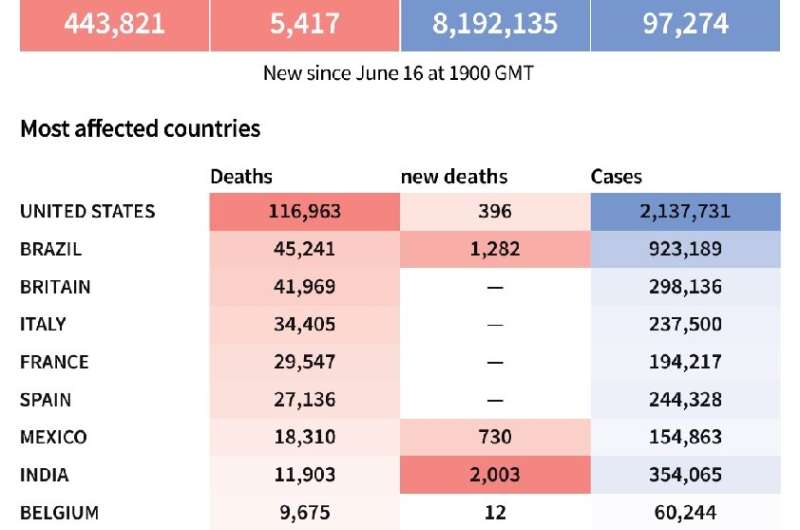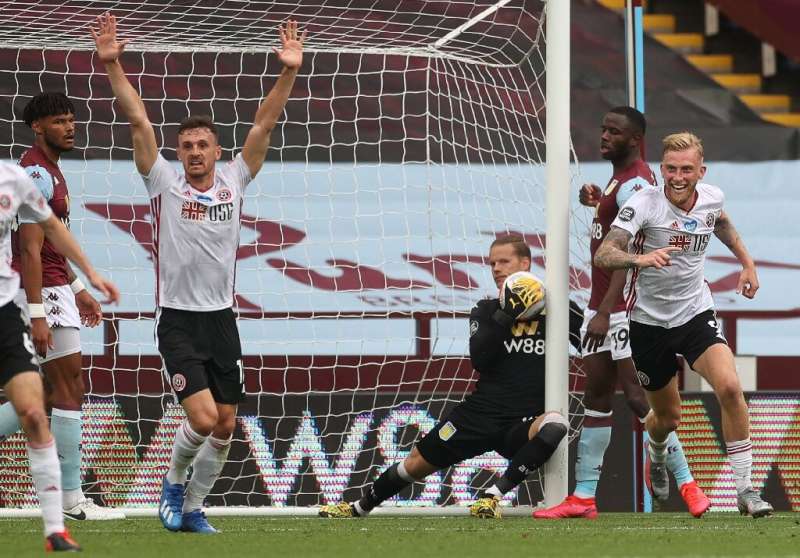People who had their car number plates recorded in the area of the Xinfadi market where a new COVID-19 coronavirus cluster emerged last week, wait in line to do swab tests for the coronavirus at a testing centre in Beijing.
China closed schools in Beijing and restricted air travel from the capital on Wednesday to halt an outbreak of coronavirus cases and dampen fears of a second wave, as India's death toll spiked and Sweden's went above 5,000.
The new Chinese cluster and surging infections in Latin America and South Asia have raised fresh doubts about how quickly the world can control a pandemic that has so far caused more than 443,000 deaths from more than eight million infections.
The pandemic has forced sports, entertainment and cultural events off the calendar for the past three months, but the resumption of the English Premier League on Wednesday after a 100-day exile marked a return to something like normality.
And amid a frenzied scramble to find a treatment or a vaccine, British researchers announced that a common steroid could reduce deaths among COVID-19 patients.
However, the lack of a vaccine means nations continue to rely on lockdowns or other lesser restrictions to curb the spread of the virus.
'Situation is serious'
Beijing ordered further restrictions on Wednesday after reporting 31 more cases, taking its total to 137 in the past six days in an outbreak linked to a sprawling wholesale market called Xinfadi.
More than 1,200 flights were cancelled in the capital on Wednesday, state media reported, schools were shut and residents were urged not to leave their homes.
Medical staff along with Hindu hardline group Rashtriya Swayamsevak Sangh volunteers wearing Personal Protective Equipment walk through a market for a door-to-door medical screening inside a slum in Mumbai to fight the coronavirus.
The authorities are carrying out thousands of tests.
"The situation is serious and people don't want to come out," said Bai Xue, a worker at a Beijing restaurant that has put up a notice online saying it has not sourced food from Xinfadi.
Chinese officials have ruled out the possibility that the outbreak was caused by Norwegian salmon, prompting Norway to call for the resumption of sales.
While China fears a full-blown second wave, nations such as India are just beginning to feel the full force of the pandemic.
The South Asian nation of 1.3 billion people reported more than 2,000 deaths on Wednesday, bringing its total to nearly 12,000—the fourth-highest caseload in the world.
Hospitals in the financial capital Mumbai have been overwhelmed and authorities in New Delhi have taken over hotels and banquet halls to house patients.
Tourists visit the Court of the Lions (Patio de los Leones) at the Alhambra in Granada on the day it reopened after three months of closure due to the coronavirus pandemic.
While there have been surges in Iran and Saudi Arabia, Latin America remains the global epicentre.
Brazil, the worst-hit nation after the United States, reported its highest daily jump in cases, and Peru's toll surged past 7,000—although officials said the number of new cases had begun to fall.
The president of Honduras became the latest public figure to test positive for the virus, Juan Orlando Hernandez telling journalists his symptoms were mild and he would work from home.
A study in Britain provided respite, researchers finding that a widely available steroid called dexamethasone reduced deaths by one third among the most severely ill patients.
"Dexamethasone is inexpensive, on the shelf, and can be used immediately to save lives worldwide," said Oxford professor Peter Horby.
World Health Organization head Tedros Adhanom Ghebreyesus congratulated scientists for the "lifesaving scientific breakthrough".
A girl cries at a makeshift camp in Bogota where jobless and homeless Venezuelan migrants remain during the pandemic. Venezuelan President Nicolas Maduro announced last week restrictions for nationals wanting to return to their country from Colombia.
'A little bit weird'
European nations including Belgium, France, Germany and Greece have begun lifting border restrictions, hoping to save the summer tourism season.
Spain has continued to reopen tourist sites, with the Alhambra palace the latest to welcome visitors back on Wednesday.
But life is far from normal in Europe.
Sweden passed the grim mark of 5,000 deaths, as cracks began to emerge in the political consensus the government has until now enjoyed over its softer approach.
The Public Health Agency said it had recorded 5,041 COVID-19 deaths, giving it the world's fifth highest death rate at 499.1 per million inhabitants.
The German government plans to ban large events until at least the end of October, according to a draft policy document seen by AFP on Wednesday.
And political leaders are also keen to protect themselves from the virus—anyone visiting Russian leader Vladimir Putin at his country residence must walk through a device that sprays them from above and the side with disinfectant.
-
Dexamethasone, an inexpensive, on the shelf drug is being used to treat COVID-19 patients
-
World toll of coronavirus infections and deaths as of June 17 at 1100 GMT
-
The English Premier League resumed after a 100-day shutdown when Aston Villa hosted Sheffield United at an empty Villa Park
The most visible sign of normality was the return of the English Premier League when Aston Villa kicked off against Sheffield United.
All games will be played in empty stadiums, possibly with cardboard cut-outs of supporters in the stands and piped-in crowd sounds.
Manchester City manager Pep Guardiola said things would still be "a little bit weird".
UEFA, meanwhile, announced that the 2019-2020 Champions League, suspended since March, will be completed in a 'final eight' format in Lisbon in August.
The closing stages of the women's Champions League will also go ahead in an eight-team straight knock-out tournament in Bilbao and San Sebastian, in Spain at the end of August.
© 2020 AFP
